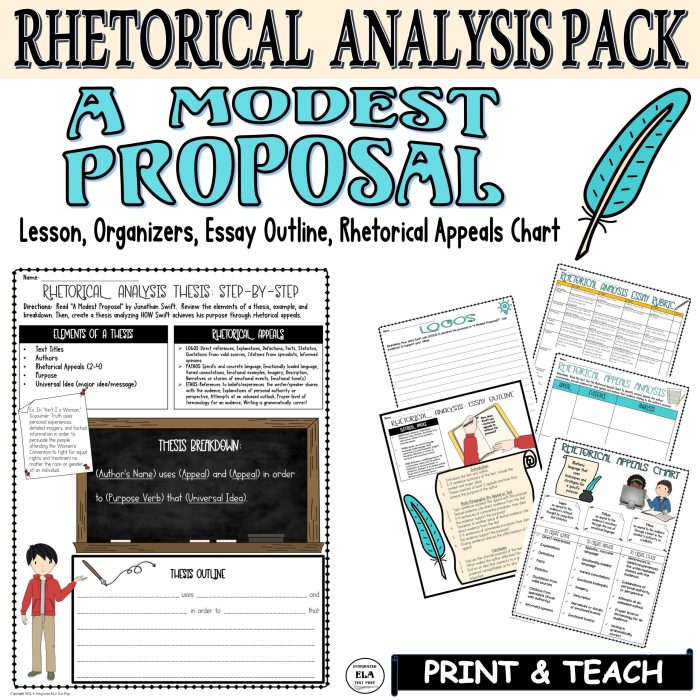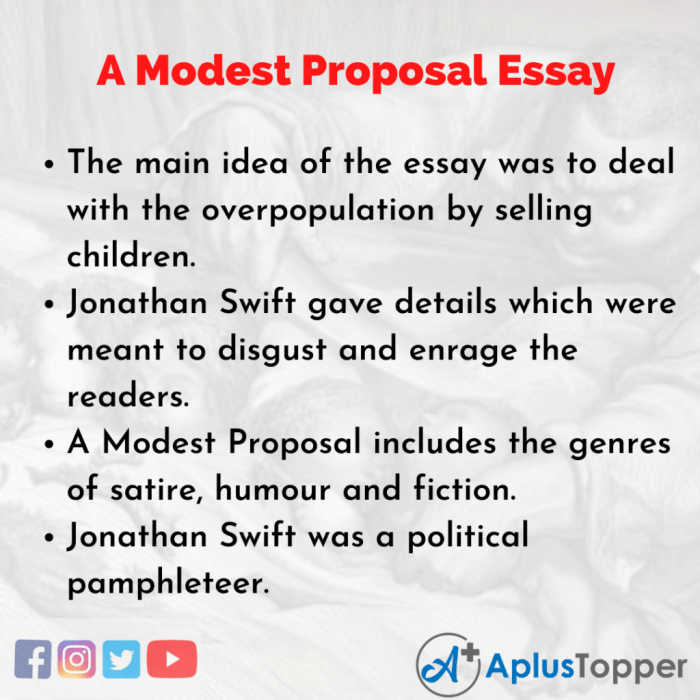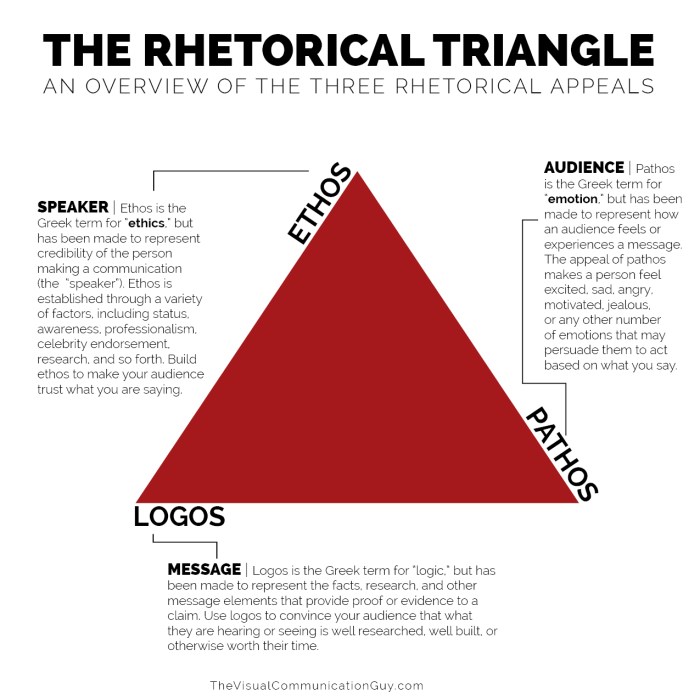A modest proposal rhetorical analysis – Jonathan Swift’s “A Modest Proposal” stands as a towering achievement in rhetorical analysis, employing a masterful blend of satire, irony, and ethical provocation to critique the social and economic ills of 18th-century Ireland. This essay delves into the rhetorical strategies, satirical targets, and enduring relevance of Swift’s provocative work, exploring its impact on readers’ understanding of social justice and human suffering.
Swift’s essay unfolds as a series of seemingly rational arguments, proposing the consumption of Irish children as a solution to the country’s poverty and overpopulation. Through this grotesque suggestion, Swift exposes the hypocrisy and indifference of the ruling class, laying bare the depths of human depravity and the urgent need for social reform.
Historical Context and Background: A Modest Proposal Rhetorical Analysis

Jonathan Swift’s “A Modest Proposal” emerged amidst the tumultuous social, political, and economic landscape of early 18th-century Ireland. The country grappled with severe poverty, rampant crime, and a deeply entrenched Protestant Ascendancy that marginalized the vast majority of the Catholic population.
Swift’s primary audience comprised the English ruling class and Irish Protestant elite. He sought to provoke and shock these influential readers by presenting a seemingly absurd and horrific solution to Ireland’s problems: the consumption of Irish children as food by the wealthy.
Political Context
Ireland was under the political and economic control of England, with the Protestant Anglo-Irish elite holding significant power. This led to widespread resentment and discontent among the Irish Catholic majority, who faced discrimination and economic deprivation.
Social Conditions, A modest proposal rhetorical analysis
Poverty was rampant in Ireland, with the majority of the population living in squalor. Beggary, crime, and disease were prevalent, and the government provided little assistance to the destitute.
Economic Factors
Ireland’s economy was heavily dependent on agriculture, and the failure of the potato crop in 1727-1728 caused widespread famine. The English government’s policies, such as the Woolens Act of 1699, restricted Irish trade and further impoverished the country.
Rhetorical Strategies
Jonathan Swift employs a multitude of rhetorical strategies in his essay, “A Modest Proposal,” to convey his satirical message effectively. These strategies contribute significantly to the essay’s overall effectiveness, allowing Swift to present his argument in a persuasive and engaging manner.
Satire
Satire is a prominent rhetorical strategy used throughout the essay. Swift employs satire to ridicule and criticize the social and political issues of his time, particularly the widespread poverty and inequality in Ireland. By presenting a seemingly absurd and outrageous solution to these problems, Swift highlights the absurdity of the current situation and the lack of meaningful action from those in power.
For example, Swift’s proposal to sell poor children as food to wealthy landowners is a satirical exaggeration that exposes the dehumanizing treatment of the poor in Ireland. The proposal is so extreme that it forces readers to confront the underlying social injustice and the indifference of the ruling class towards the suffering of the poor.
Irony
Swift also uses irony to convey his message. Irony involves the use of words or phrases to convey a meaning that is opposite to their literal meaning. In “A Modest Proposal,” Swift uses irony to highlight the hypocrisy and absurdity of certain societal norms and practices.
For instance, Swift’s suggestion that eating children would be beneficial for both the children and the economy is a clear example of irony. The proposal is presented as a serious and rational solution, yet it is so outlandish that it forces readers to recognize the absurdity of the situation.
This use of irony serves to emphasize the severity of the problems facing Ireland and the need for urgent action.
Other Rhetorical Devices
In addition to satire and irony, Swift employs a variety of other rhetorical devices to enhance the effectiveness of his essay. These include:
- Hyperbole:Exaggeration for emphasis, such as “a child will make two dishes at an entertainment for friends.”
- Understatement:Downplaying the significance of something, such as “the loss of a few thousand people.”
- Rhetorical questions:Questions posed for effect, not expecting an answer, such as “What is more usual or more easy than for a father to sell his own child?”
- Pathos:Appeals to emotions, such as the description of the starving children and their mothers.
These rhetorical devices work together to create a powerful and persuasive essay that exposes the social and political injustices of Swift’s time. By employing satire, irony, and other rhetorical devices, Swift effectively conveys his message and forces readers to confront the harsh realities of the world around them.
Structure and Organization

Jonathan Swift’s “A Modest Proposal” is a satirical essay that argues for the consumption of Irish children as a solution to the country’s poverty and overpopulation. The essay is structured in a highly organized and logical manner, which contributes to its rhetorical impact.
The essay begins with a brief introduction that establishes the problem of poverty in Ireland. Swift then presents his “modest proposal” in a series of headings and subheadings, each of which develops a different aspect of the argument. For example, one heading is “Of the Advantages to the Kingdom,” which lists the benefits that Swift believes would result from eating children, such as reducing the population and providing food for the poor.
Swift’s use of headings and subheadings helps to organize his argument and make it easy for readers to follow. The headings also create a sense of suspense, as readers are eager to see what Swift will propose next.
In addition to headings and subheadings, Swift also uses other organizational elements, such as bullet points and numbered lists. These elements help to break up the text and make it more visually appealing. They also help to emphasize Swift’s main points.
The overall structure and organization of “A Modest Proposal” is highly effective. The essay is well-organized and easy to follow, and the use of headings and subheadings helps to create a sense of suspense and emphasis.
Use of Headings and Subheadings
Swift’s use of headings and subheadings is a key part of the essay’s rhetorical impact. The headings and subheadings help to organize the essay and make it easy for readers to follow the argument. They also create a sense of suspense, as readers are eager to see what Swift will propose next.
For example, the first heading in the essay is “Of the Advantages to the Kingdom.” This heading immediately grabs the reader’s attention and makes them want to read on to see what advantages Swift will propose. The subheadings under this heading then develop the argument in more detail, providing specific examples of how eating children would benefit the kingdom.
Swift’s use of headings and subheadings is also effective in creating a sense of irony. The headings are often very serious and formal, while the subheadings are often very humorous and satirical. This contrast creates a sense of irony that highlights the absurdity of Swift’s proposal.
Use of Bullet Points and Numbered Lists
In addition to headings and subheadings, Swift also uses bullet points and numbered lists to organize his argument. These elements help to break up the text and make it more visually appealing. They also help to emphasize Swift’s main points.
For example, in the section “Of the Advantages to the Kingdom,” Swift uses a bullet point list to list the benefits of eating children. This list helps to make the argument more concrete and easier to understand. It also helps to emphasize the absurdity of Swift’s proposal.
Swift’s use of bullet points and numbered lists is effective in organizing his argument and making it more visually appealing. These elements also help to emphasize Swift’s main points.
Ethical and Moral Implications

Swift’s “A Modest Proposal” explores the ethical and moral implications of extreme poverty and societal neglect. The essay’s central argument—that Irish children should be sold as food to alleviate the burdens of their families and the state—is a grotesque satire that exposes the inhumane treatment of the poor.
Extent of Seriousness
Swift’s proposal is not intended to be taken seriously. Instead, it serves as a reductio ad absurdum, a logical argument that takes an extreme position to highlight the flaws in a system. By proposing such a heinous act, Swift forces readers to confront the moral bankruptcy of a society that allows its most vulnerable members to suffer.
Impact on Readers
The essay has a profound impact on readers’ understanding of social justice and human suffering. Swift’s use of satire and irony forces readers to question their own complicity in the perpetuation of poverty and inequality. The essay challenges readers to consider the ethical implications of their actions and to demand a more just and compassionate society.
Literary and Historical Significance

Jonathan Swift’s “A Modest Proposal” holds immense literary and historical significance as a satirical masterpiece that critiques the social, economic, and political ills of 18th-century Ireland. Its enduring relevance and continued impact on contemporary society stem from its incisive wit, timeless themes, and profound influence on literature and social commentary.
Influence on Literature and Social Commentary
Swift’s essay has inspired countless works of literature and social commentary. Its satirical approach, blending humor and outrage, has been adopted by writers such as George Orwell, Mark Twain, and Kurt Vonnegut. Its exploration of poverty, inequality, and social injustice has influenced social movements and shaped public discourse on these issues.
Enduring Relevance and Impact
“A Modest Proposal” remains relevant today due to its timeless themes of human suffering, social inequality, and the failures of governance. Its critique of economic exploitation, the plight of the poor, and the indifference of the ruling class resonates with contemporary audiences grappling with similar challenges.
The essay’s enduring impact lies in its ability to provoke thought, challenge assumptions, and inspire action.
Q&A
What is the central argument of “A Modest Proposal”?
Swift proposes the consumption of Irish children as a solution to poverty and overpopulation, satirizing the indifference of the ruling class and the depths of human depravity.
How does Swift use irony in the essay?
Swift employs irony by presenting his grotesque proposal in a rational and matter-of-fact tone, highlighting the absurdity of the ruling class’s neglect and the desperate state of the Irish people.
What is the ethical significance of “A Modest Proposal”?
Swift’s essay challenges readers to confront the ethical implications of social injustice and the limits of human compassion, raising questions about the responsibility of the wealthy and powerful to address the needs of the poor and vulnerable.